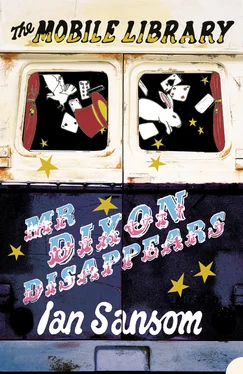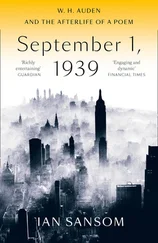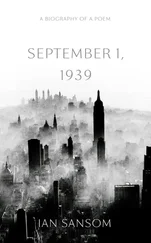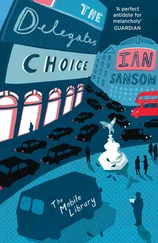While the caretaker hovered nervously by the door, shifting from foot to foot in a state of profound agitation, Israel absentmindedly picked up some of the files and paperwork from the floor and put a couple of the chairs back upright; he did like things tidy.
The only real distinguishing feature in the room were the few framed photographs on one wall, showing the various Messrs Dixon and Pickering through the ages, standing outside the store, their arms folded, at first unsmiling, black and white men in bowler hats, and then, later, more recently, grinning, bare-headed men in full colour, as though the whole world and the weather had been warming up and cheering up over the past hundred years. The photograph of the current Mr Dixon showed a man of almost negligible features – a face that would not stand out in a crowd. From all his research into the history of Dixon and Pickering’s, Israel knew only this about Mr Dixon: he’d inherited the business from his father, who’d taken it on from his own father, the founder; he wore dark suits and white shirts; and he took his responsibilities seriously. Widely respected in the community, upright and upstanding, Mr Dixon was someone to whom nothing interesting had ever happened. His office was beige: his life was bland.
The phone rang. Instinctively, Israel reached across the desk and picked it up.
‘Hello?’
‘Michael? Is that you?’
‘No. I’m afraid, I’m…’
The phone went dead.
‘Who was that?’ asked the caretaker. ‘The police?’
‘I don’t know. It was a woman. What’s Mr Dixon’s first name?’
‘Mr Dixon he is to us here just.’
‘Right.’
Israel and the caretaker stood silently for a moment and there was the distinct sound of Prince’s ‘1999’ being played slowly and purposefully on classical guitar: the muzak that played throughout the store was piped in here too.
He was trying to think straight.
‘Right. Right. Erm…God. First. Right. Would you mind turning the music off?’
‘What?’
‘Can you turn the music off?’
‘What’s the point of that?’
‘Because! I can’t think. I need to…’
‘But Mr Dixon likes it on in the morning.’
‘But Mr Dixon isn’t here and I’ve got his blood all over my hands!’
The caretaker went to turn off the music.
Israel had never been at the scene of an actual crime before, unless you counted the time he’d sneaked with some friends into a screening of a Star Wars film in Whiteley’s while another friend distracted the attention of the usherette, or the time he’d taken an extra exercise book from the school supplies cupboard. But that was different. This was your actual true crime.
And he suddenly realised that he was in very big trouble.
‘Right, don’t move,’ said a voice behind Israel. ‘Stand where you are. Hands raised above your head.’
It was Sergeant Friel.
‘Ah, thank God, Sergeant,’ said Israel, turning around, not raising his hands.
‘Raise your hands,’ repeated Sergeant Friel. He was flanked by two police officers holding guns. And the guns were pointed at Israel. ‘Hands!’
Israel raised his hands.
‘So, Mr Armstrong,’ said Sergeant Friel, half in question, half in statement, and entirely in disbelief. He then slowly stroked his moustache and added, clearly disappointed, ‘All right, boys, lower your weapons. It’s only the librarian.’
Israel and Sergeant Friel had met on several occasions before, none of them exactly propitious: once when Israel had been mysteriously nearly run over by a speeding car when he’d first arrived in Tumdrum; again a few months later when Israel had caused an obstruction on a public highway by parking the mobile library too close to a corner; and again on a regular monthly basis, on Monday nights, when Sergeant Friel came with Mrs Friel to the mobile library to change their books. (Sergeant Friel had a taste for true crime, Israel recalled – Mrs Friel was more romantic fiction – and you might have thought he’d have liked a bit of a change, Sergeant Friel, given his line of work, though admittedly it was mostly serial killer stuff he was borrowing and in all likelihood there wasn’t too much of that in the daily life of a policeman in Tumdrum and District.) They had exchanged cross words across the issue desk on a number of occasions, Israel and the sergeant, which was shocking, really: even the PSNI were no better than anyone else at returning their books on time. Rosie was relaxed about fines, but Israel always made them pay. He was a stickler for the fines, Israel.
And now this was role reversal.
The beige office, which was empty just moments ago, was suddenly filled with men everywhere: police officers in police uniforms, police officers in plain clothes, police officers in white paper-suit uniforms.
Israel didn’t know where to look, or what to say. He looked at Sergeant Friel.
‘I’m sorry. I can’t get my head round this.’
‘OK, Mr Armstrong,’ said Sergeant Friel. ‘What did you say? You can’t get your head round it?’
‘That’s right. I can’t get my head round it.’
Sergeant Friel wrote something in a small black notebook.
‘OK,’ he said. ‘What time did you arrive here exactly, Mr Armstrong?’
‘Erm…’
Sergeant Friel again wrote in his little black book.
‘I…’
Sergeant Friel wrote something else.
‘Are you writing all this down?’ said Israel.
‘Of course.’
‘Why?’
‘Because because,’ said Sergeant Friel.
‘Because of the wonderful things he does?’ said Israel.
Sergeant Friel took a note of this remark too.
‘You don’t have to write that down! That was a joke. That was—’
Sergeant Friel cleared his throat and appeared to be about to deliver a speech.
‘I am keeping a contemporaneous record of our conversation, Mr Armstrong. Because we’re going to have to take you in for questioning.’
‘What?’
‘You may have some vital information.’
‘But I was just here setting up my exhibition.’
‘Your what?’
‘My five-panel touring exhibition on the history of Dixon and Pickering’s. Downstairs…’
‘Ah, well.’ Sergeant Friel noted this down carefully. ‘This is a major crime scene now.’
‘But—’ began Israel.
Sergeant Friel cleared his throat again and began another speech. ‘You do not have to say anything, Mr Armstrong. But it may harm your defence if you do not mention when questioned something which you later rely on in court. And anything you do say may be given in evidence.’
Israel stared at him, wide-eyed. ‘What?’
‘Do you understand that, Mr Armstrong?’
‘Yes. Of course I do. No. I mean, no. I mean…What? What are you talking about? You can’t take me in for questioning. What about my exhibition? I’ve worked for months getting all that stuff together.’
‘That’s hardly important now, is it, Mr Armstrong?’
‘It may not be important to you, Sergeant, but I spent months getting those photographs laminated!’
‘Aye, well, that’s howsoever.’ Sergeant Friel was still scribbling in his notebook. ‘And if you could speak more slowly and clearly?’ He raised a finger. ‘And just put these on.’
Another policeman stepped forward and dangled handcuffs in front of Israel.
‘What?’
‘Handcuffs, please,’ said Sergeant Friel.
‘Look, if this is because of the fines,’ said Israel.
‘The what?’
‘The library fines. You know. Because you never return your true crime books on time, and now you’re persecuting me because—’
‘Ach!’ said Sergeant Friel, his face reddening around his moustache. ‘This is nothing to do with library fines! This is an extremely serious matter, Mr Armstrong, and I suggest you start taking it seriously. There has been a major robbery here, and a suspected kidnapping, and you are on the scene, so we’re taking you in. It’s really quite simple. Now put these on.’
Читать дальше












